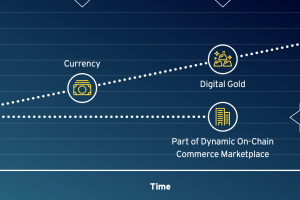Bitcoin Could Become the Global Trade Currency Says Citi

“As its global reach continues to expand, Bitcoin’s borderless design and other features may position it to become an international trade currency in the future.”
So says Citi in a 108 pages report entitled Bitcoin at the Tipping Point where they analyze its transformation and where it might be headed.
They say initially the focus was on blockchain the technology, this new way of preventing double spends and keeping accounts in a new type of payment.
Then there was the focus on censorship resistance and as a store of value for a currency with apparently 35% of US businesses accepting bitcoin according to the report.
They argue now the focus is on scarcity with bitcoin seen as digital gold due to its finite supply, but its final form they say is as a global currency facilitating international trade.
“A focus on global reach and neutrality could see Bitcoin become an international trade currency. This would take advantage of Bitcoin’s decentralized and borderless design, its lack of foreign exchange exposure, its speed and cost advantage in moving money, the security of its payments, and its traceability,” they say.
Bitcoin’s biggest strength and its biggest driver from a fundamentals perspective has been speculated for some time to be its role in international trade.
It is somewhat small relatively speaking, but it is what puts a floor on its price and brings constant demand that is not sensitive to price movements because they’re using it for the specific function of moving value.
A Brazilian merchant paying a Chinese shipper can go through all the American banks with their potential risks, as well as potential delays, or can finish the deal in ten minutes by paying with bitcoin.
“If merchants can move seamlessly between the fiat, cryptocurrency, and stablecoin realms, there are certain advantages that Bitcoin may offer that differentiate it from central bank digital currency or from stablecoins,” Citi says, adding:
“A decentralized cryptocurrency might be preferred as no government or outside entity can take steps that might affect the supply of the trade currency, helping to decouple trade from political considerations.
While the U.S. dollar is often the default trade currency today, growing tensions between the U.S. and China are creating concerns about the future.
The most well-established and liquid cryptocurrency is Bitcoin, making it the likely beneficiary of a move to a new crypto trade currency. Bitcoin would be able to move from one trade partner’s digital wallet to the other’s wallet with little friction.
As the ‘international trade’ currency, those engaged in cross-border activities may leave their Bitcoin in their wallets until the funds are needed.
Follow-on transactions could be contracted and conducted without any need for a currency exchange. Funds could move back and forth within the Bitcoin network and only be withdrawn and exchanged when account owners needed money to operate in a local economy.”
Some of this is already happening. In places like South Africa, where there are strict political capital controls to save the much printed Rand, bitcoin for some is a way to join the global economy.
In places like Venezuela, bitcoin is a way to survive. In Argentina, it’s either bitcoin or dollars because pesos hardly keep their value, and dollars are hard to come by, while bitcoin is perhaps the most accessible asset in the planet because kids in their bedrooms have coded up the global digital infrastructure to their liking.
We could go on, but its rise as a global trade currency mainly since 2018 is probably one big factor for institutional investors considering this as a valuable asset for their investment portfolio.
It shines in international payments, and therefore it probably will grow in adoption as more commercial ‘nodes’ are added in the creation of a global bitcoin based trading economy.
Whether that has reached the tipping point isn’t too clear. The report doesn’t provide much analysis there, but what we do know is that global trade is happening with bitcoin and thus we’re at the inception of a new monetary economy for the first time since the 1500s.
Source: Read Full Article
